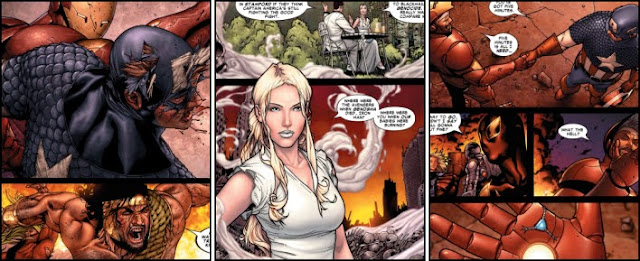 |
| CIVIL WAR No. 4, October 2006 |
Fortunately however, Tony Stark’s single-mindedness undeniably leads to some sensational confrontations within this twenty-two page periodical, most notably his patronisation of a badly-beaten Captain America, who despite his jaw “practically hanging off”, still has enough steel inside of him to stand up against the fully-armoured “pampered punk”. Utterly oblivious to all the pain and suffering his sonic attack is causing to all those super-heroes around him, the “mechanical engineer” genuinely seems to enjoy watching the Sentinel of Liberty suffer, and even goes far as to demean the “tough old bird” for “still getting up” when other people’s brains would have simply shutdown due to the sound waves.
Easily this publication’s most shocking moment though, has to be the horrific death of Goliath at the hands of a scarily-deranged Thor. This tragic moment is clearly the tipping point for some of Stark’s less convinced followers, such as Invisible Woman and Spider-Man. But also goes to show just how coldly calculating Iron Man has apparently always been when it is subsequently revealed that the murderous Thunder God is simply a cybernetic clone created from a strand of hair Tony covertly acquired from his furniture following “the first meeting of the Avengers.”
Ably enabling this comic to additionally be a visual tour-de-force are Steve McNiven’s layouts and Dexter Vines' inks, which really help imbue even the more sedentary scenes towards the back of the book, with plenty of emotional energy. Bill Foster’s killing is tremendously well-drawn, and the sheer horror upon all those who witness his dreadful demise is clearly etched in everyone’s facial expressions; “I thought you said you knew what you were doing, Tony. I thought we were doing this so no one else got hurt.”
 |
| Writer: Mark Millar, Penciler: Steve McNiven, and Inker: Dexter Vines |




